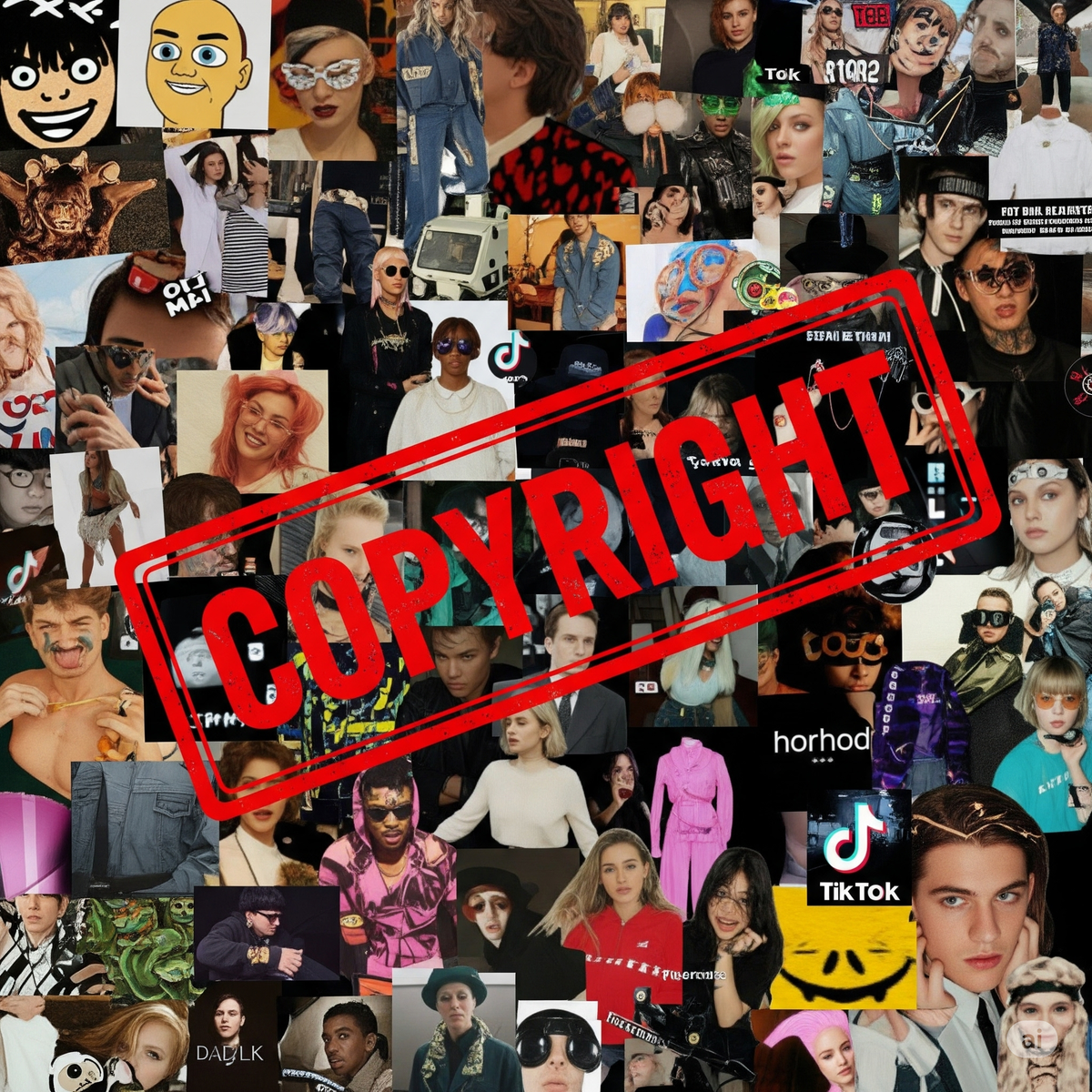Is Pop Culture Breaking the Law? The Rise of Copyright Theft in Memes and Merch
From viral memes to bootleg merch, pop culture is facing a legal reckoning. As creators remix and monetize copyrighted content, questions arise: where’s the line between homage and theft? Explore the legal gray zone of today’s remix-driven internet economy.

New York City, June 27, 2025
In the mad whirl of 2025's internet culture, the distinction between inspiration and infringement has never been more ambiguous. Pop culture particularly the viral universe of memes, knockoff fashion, and TikTok remixes has moved into a legal gray area where copyright law is pushed to its limits, broken, or simply disregarded. But since the culture breeds from reusing and remaking content, lawsuits are mounting, artists are fighting back, and the question becomes: is this new digital creativity era legal or merely legally ignored?
Meme Culture vs. Copyright Law: Who Owns the Joke?
Memes are made to be spread, remixed, and memed once more. However, what if someone uses an original photo, puts up a witty caption, and suddenly it goes viral without the author's approval?
In a number of recent legal cases accessed through Justia and CourtListener, creators of memes have brought suits against unauthorized use of their images by big companies and media channels. For instance, when fashion companies started utilizing viral meme screenshot images in their social campaigns without a license, it created room for copyright claims.
In U.S. law, memes may be "derivative works," but their legality relies on fair use: a highly subjective concept. Is the meme sufficiently transformative to pass muster under copyright, or is it outright reuse? Judges are now struggling to define humor as a defense in law.
Viral Doesn't Mean Free: Misconceptions About Online Sharing
Going viral doesn’t erase copyright. Even widely shared memes, videos, and songs are often protected, and reposting them without permission can lead to legal trouble. Fair use is not automatic especially when profit or reach is involved.
TikTok Remix Culture: Art or Infringement?
TikTok lives on remixing be it users overlaying their voices on movie clips, artists singing duets on copyrighted songs, or fans replicating scenes from copyrighted television shows. Remix culture has, however, also brought with it an onslaught of legal notices.
In a 2023 federal court case (accessed on CourtListener), a music company sued TikTok creators who employed unauthorized samples in viral dance clips that ran advertisements. Their defense: "We didn't know. Everyone does it."
Sorry for them, ignorance is not an excuse for copyright law.
Fair use reappears. Courts balance factors such as:
- The intent of the remix
- Whether it hurts the original work's market
- The scale of copied content
- Whether transformative or merely derivative
The outcome: an influencer minefield, with many having no legal support to resist when takedowns occur.
Algorithms and Liability: Who's Really Responsible?
- TikTok and Instagram reap profits from went-viral remixes
- Algorithms routinely amplify unlicensed material without filters
- When takedowns do lead to lawsuits, the platforms never seem to get punished
- Regulators are now questioning responsibility of algorithms
Bootleg Fashion: Streetwear's Legal Knock-Off Crisis
The fashion industry is familiar with copy culture, but the emergence of bootleg star merchandise has made lawsuits a new status symbol.
Independent designers today make parody tees, ironic logos, and mashups with protected IP all in a legal limbo. One such case reported in Justia had a streetwear company sued by a worldwide pop star for making bootleg tour merchandise with their face and lyrics without their consent.
Ironically enough, some celebrities actually wear these bootlegs themselves, confusing the judge.
The question remains: where does homage stop and theft start?
When Influencers Turn into Infringers
Influencers unintentionally infringe upon copyrights by selling or advertising bootleg merchandise, sharing memes, or applying licensed music to monetized videos. As influencer marketing expands, so does exposure to the law.
The Internet Is Watching: Cancel Culture Meets Copyright
What drives these lawsuits to go viral isn't the legal narrative it's the public outcry. When corporations and artists sue meme accounts or remixers, they stand to look out-of-touch or anti-creator.
A photographer who took a meme page to court for sharing their hit photo faced mass reporting drives and online harassment, even though they had legitimate legal grounds. This "mob morality" tends to silence small creators from enforcing their rights.
Meanwhile, Google Trends indicates a steady trend of increased search terms such as "fair use law TikTok," "meme copyright 2025," and "bootleg merch legal or not," which reflect public interest and confusion.
Is Copyright Law Obsolete?
Most copyright legislation was drafted decades ago, before TikTok or memes were anywhere on the horizon. They weren't crafted for a society in which creativity relies on endless remixing, irony, and expediency.
Legal experts (through Archive.org) have contended that the Copyright Act of 1976 is outdated for the internet age. Some recommendations for updating it are:
- Mandatory APIs for licensing content reuse
- Shielding of small creators from corporate takedowns
- Wider fair use for commentary and parody definitions
- But until reform occurs, digital creators work in limbo.
Case Studies: When Creators Fight Back
Meme Lawsuit 2022: A photographer sued a 3M-follower meme page for unauthorized reuse. They settled out of court for an unknown sum, but the case stood as a precedent for others.
Bootleg Streetwear Battle: A record label sued a bootleg streetwear brand selling unauthorized artist merchandise on Instagram. The label won in court, causing the brand to close down and forfeit profits.
TikTok Audio Takedown: A viral audio clip that had been used on more than 500k TikToks was taken down following a mass takedown request by the copyright holder, leaving influencers reeling and fans enraged.
The Future: Will AI Make It Worse?
AI-generated content now impersonates celebrity voices, artwork, and logos—all without permission. Applications such as DALL•E and Suno can remix available IP in seconds.
That brings serious questions to mind:
- Can you copyright a deepfake?
- Who owns AI-generated memes?
- Is it illegal to train AI on copyrighted information?
Look for epic court wars within 18 months.
Why This Matters to All of Us
Whether you're an artist, influencer, meme king, or simply a fan, this war in the courts impacts you. If copyright laws don't keep pace with culture, we'll either stifle online creativity or open the gates to chaos. Pop culture is built on remix. But without clear-cut laws, creators are either in danger of being sued or muzzled.
Last Words: Working Through a Legally Tenuous Culture
Pop culture is getting ahead of the legal infrastructures designed to contain it. Memes, remixes, and streetwear are just more than fun they're contemporary tools for storytelling. But without a refreshed set of copyright protections and clearer guidelines on fair use, creators and brands both continue to be at risk.
We’re witnessing a pivotal moment where digital expression collides with intellectual property law. The outcome of these ongoing legal battles will define the future of internet culture and who gets to profit from it.
Sources:
- CourtListener.com – Music label v. TikTok creators case
- Justia.com – Bootleg merch lawsuit
- Archive.org – Scholarly article: “Reforming the Copyright Act for a Digital Era”
- Google Trends – Search: “meme copyright 2025”
- U.S. Copyright Office – Newsroom and policy updates
- WIPO (World Intellectual Property Organization) – AI and Copyright Reports
- The Verge – TikTok takedown wave
- Billboard – Streetwear bootleg litigation




